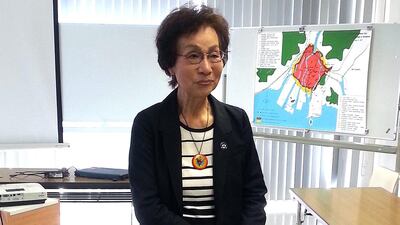Final appeals before non-proliferation meeting begins
HIROSHIMA // Residents and officials of a city devastated by an atomic bomb made their final pleas before the start of the eighth meeting of the Non-Proliferation and Disarmament Initiative for countries to agree to give up their nuclear arms.
The UAE is one of the 12 countries taking part in the initiative, which aims to promote the elimination of nuclear weapons. Its latest meeting started yesterday and ends today.
Dr Sultan Al Jaber, Minister of State, is heading the UAE delegation and Hamad Alkaabi, UAE ambassador to the International Atomic Energy Agency, is also attending.
“We have to convey in an accurate manner the reality of what happened in Hiroshima so that this will never happen again,” said Emiko Okada, one of the last survivors of the atomic bomb dropped by the US on the city in August 1945. “People are making profit at the expense of other people’s lives and I hope, through conventions and agreements, that countries will agree that nuclear weapons are something that need to be totally eliminated. This is what I hope will be the outcome of this meeting.”
She said more action needed to be taken. “We need to appeal to the world to eradicate these nuclear warheads,” she said. “I think there is hardly any interest around the world, people aren’t interested.”
She told the tale of the atrocities she experienced 69 years ago, when she was only eight years old.
“We lived behind Hiroshima station and it was a beautiful sunny day,” Ms Emiko said. “I saw a shining aircraft in the sky and then heard a loud sound and intense flash of light. I had no idea what happened but immediately saw my mum with glass fragments in her head and she was bleeding.”
As residents experienced the terrible effects of radiation and burns, her family found shelter in the mountains.
“Hiroshima turned into the city of death,” she said. “When I see the sunset, it reminds me of the red sky I saw when Hiroshima burnt, so I don’t like to look at it.”
She lost her 12-year-old sister because of the attack, and developed severe health problems that have plagued her throughout her life, including gastric cancer, constant fever, blood loss and fatigue. Some of Ms Emiko’s ailments were passed on to her daughter.
“When I look back, it makes me feel like I don’t want to speak about this any more because I wonder why did we have to suffer like this?” she said. “I very strongly hope that nothing like this will ever happen again when I think about how these people died.”
Yasuyoshi Komizo, the chair of the Hiroshima Peace Culture Foundation and secretary general of Mayors for Peace, an association of mayors working for a world without nuclear weapons, said he was campaigning to legally prohibit them.
“I don’t think this is a way human beings should conduct themselves and it’s not sustainable,” he said. “Now, we have more risks that terrorists might acquire nuclear weapons technology and, if they do, they will use it.”
He said there were still 17,000 warheads in the world, 2,000 of which were high-trigger. “That means we’re still living in nuclear danger,” he said. “Nuclear weapons are only a liability, not an asset, but everything depends on the future generation and any fundamental change comes from them, so we’re focusing on younger generations.”
Kosei Mito, a volunteer guide at the A-bomb Dome in Hiroshima who was in his mother’s womb when the bomb dropped, said Japan should lead the discussion.
“The key to the success of this meeting is Japan’s attitude,” he said. “It is still hesitating because it is under the nuclear umbrella but it must be a leader in nuclear talks.”
Mr Yasuyoshi said his message from Hiroshima was the 69 years of hardships that victims went through. “They are ordinary people but they started with hatred and a sense of revenge,” he said.
“Over the years, they’ve come to the unshakeable conviction that nobody should ever suffer as they have, so if young people have the willingness to listen to those voices and use them for peace, then they can create a much better world.
“If we can succeed in those ideas then the leaders can have a reason and courage to move on to a better humanitarian system of security.”
cmalek@thenational.ae
@ For more on Japan, visit thenational.ae/topics

